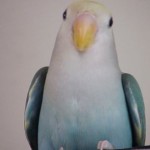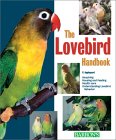The Hormonal Hen: Ouch!

Sweet little lovebirds can turn nasty when hormones kick in
Sometimes you just get a hen who is determined to mate. The hen chooses you to be this “mate.” You are now the recipient of nasty bites whenever you get too close to another human being. Basically, your roommate, spouse, or other family member becomes a threat. The jealous little hen will bite you to make you move away from them. Sometimes the hen will become aggressive toward the family member and suddenly lunge out to bite them when they stand or sit next to you.
Obviously this is a serious problem and can make everyone in the home miserable.
The first step is to re-set boundaries and dominance. Generally, hens need a very strong-willed owner. A lovebird hen is much like an amazon parrot. They are very territorial when hormones are raging and they will attack if they feel their “nest” or “mate” is threatened. While a lovebird cannot do the kind of damage an amazon can do, it still isn’t pleasant to have their little beak sink into your flesh.
Sometimes this problem can be managed by having the “threats” handle the bird more often when the “mate” is not home. You will often find that when a lovebird hen overly bonds to one person, they are only aggressive when they are in the presence of that person. By spending time with the bird when they do not have to focus on protecting their mate, the other family members can forge a stronger bond with the bird.
It Has Gone Too Far
Unfortunately, many people do not realize the implications of owning a parrot when they first pick up the cute, squeaking baby from the breeder or pet store. A lovebird is a parrot, and it can develop the same behavioral problems as any larger species if not handled properly. In the case of biting, many people give up, feeling it has just gone too far and they can no longer trust the bird. I do think this is unfortunate in most cases. I had a senegal who developed terrible aggression at age four. I decided I would do whatever it took to develop trust again after this bird has seriously bit my face on two occasions. I am glad I made that decision.
Max is six years old now and we have learned so much about each other. I now understand the mistakes I made in raising Max from a baby. Because he is a parrot, Max is very intelligent and has learned the new rules of the house. It wasn’t easy, but by re-structuring the environment and adjusting my attitude about I should expect from Max, I have been able to develop an incredible bond with this bird. I truly believe that most birds can be turned around when they develop aggressive behaviors, but only if their owners understand that they are birds–they are not people–and they cannot be expected to act like people. They are not on earth to make us feel loved and adored at all times. They are separate beings who have their own needs and wants. When that fact is respected, the strongest bonds are formed.
The Extreme Case
I will admit that there are some extreme cases where a hormonal hen is best in a breeding situation. These birds become extremely aggressive and constantly search for nesting material. They will lay egg after egg until they are exhausted. They attack any one who comes near their “nest”. I encourage anyone with type of bird to try to locate a local breeder who may be willing to take the bird in. The worst thing that can happen is that these birds end up locked in a cage 24 hours a day with no interaction or companionship.









